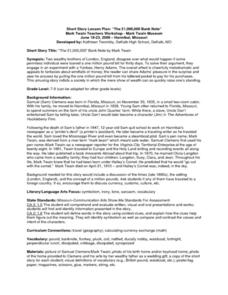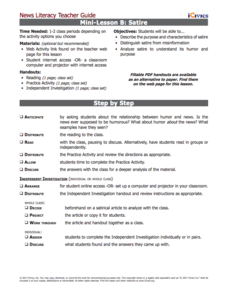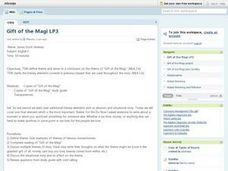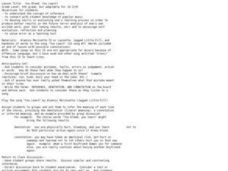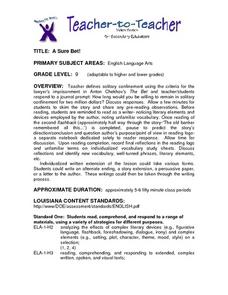Curated OER
Irony in "The Gift of the Magi"
Use O. Henry's ubiquitous tale of love and poverty to explore irony. After reading the story, middle schoolers identify examples of all three kinds of irony in the story. With partners, they brainstorm original examples of irony. Then...
Curated OER
Understanding Irony
Students discuss irony. In this language arts lesson, students identify irony and give examples of irony from their lives, a book, and current events. Students classify types of irony.
Curated OER
"The 1,000,000 Pound Bank Note" by Mark Twain
Compare real events from Mark Twain's life to events in the story. Middle school readers identify point-of-view, its purpose, and its reliability by citing two examples. They describe the tone of the story using four examples and...
Curated OER
"Shooting An Elephant": George Orwell's Essay on His Life in Burma
High school readers examine George Orwell's essay "Shooting an Elephant" for examples of symbolism, metaphor, connotation, and irony. They analyze how these literary tools convey the writer's main point and contribute to the persuasive...
Curated OER
Editorial Cartoons
Do your classes love reading and drawing cartoons? Middle schoolers read an editorial cartoon from a newspaper. They discuss the cartoonist's topic, audience, and purpose. Next, they brainstorm questions they have about the cartoon and...
Curated OER
Gift of the Magi
While reading O Henry's "The Gift of the Magi," your class will define and identify situational irony and allusion. Use a study guide (not included, but easy to produce) to record and discuss examples of allusion as you read. Map the...
Curated OER
The Tell-Tale Heart
Bring Edgar Allan Poe's spooky story to life! After reading the short story "The Tell-Tale Heart," middle and high schoolers identify the theme, character traits, irony, and other story concepts. During pre-reading, they take notes,...
iCivics
Mini-Lesson B: Satire
Hey, what's so funny? Explore the use of satire in a variety of media with a hands-on lesson. Fourth in a five-part journalism series from iCivics, the activity introduces satirical language in print and online. Pupils work alone or in...
Curated OER
Introuction to Irony
Learners investigate the literary concept of irony and how it fits into literature. They also brainstorm real life examples of irony and how they apply to people. Students identify their favorite examples of irony.
Curated OER
When I Set My Hat at a Certain Angle: Trying on Zora Neale Hurston's Voice to Dress-up Prose
After reading and evaluating examples of prose nonfiction by Zora Neale Hurston and other authors, high schoolers write a personal reflective essay rich in figurative language. By incorporating this strategy, they utilize voice within...
Curated OER
Literature: Satire in the American Dream
Eleventh graders examine cartoons for examples of satire, irony, and sarcasm. They write essays about cartoons, art work, or literature analyzing it for satirical elements. Finally, they create their own piece in one of the three areas...
Curated OER
Gift of the Magi Lesson Plan 3
Explore the literary concept of theme through the The Gift of the Magi. Starting with a class discussion, the concept of theme is explored through examples from famous stories and movies. Next, the class analyzes the possible themes of...
Curated OER
You Bleed, You Learn?
Jump back into the 90s with Alannis Morissette's song "You Learn." After hearing the song, small groups analyze the lyrics and write an essay about a mistake they've learned from. Use the example sentences to identify the denotative and...
Eastconn
Learning to Analyze Political Cartoons with Lincoln as a Case Study
Discover the five main elements political cartoonists use—symbolism, captioning and labels, analogy, irony, and exaggeration—to convey their point of view.
Curated OER
Across Five Aprils/Civil War
Eighth graders study the Civil War novel, Across Five Aprils, by Irene Hunt. They review vocabulary and literary elements and write a "Brother Against Brother" essay about coming face to face with a brother in one of the battles of the...
Curated OER
Music from a Place Called Half Moon
Young scholars read the novel, Music from a Place Called Half Moon. They are assigned chapters to analyze for literary elements and to assign titles to the book chapters.
Dream of a Nation
Writing a Narrative Essay
Imagine using narrative essays to encourage change. This multi-week unit plan does just that. After reading a series of articles from Tyson Miller's Dream of a Nation: Inspiring Ideas for a Better America, class members examine the...
National WWII Museum
Dr. Seuss and WWII
What famous children's author and illustrator created World War II political cartoons featuring such subjects as fascism, the war effort, discrimination, and the dangers of isolationism? The who in this story is Dr. Seuss, and what...
Curated OER
A Sure Bet!
Ninth graders analyze Chekhov's "The Bet". They repsond to a journal quesiton and use examples from the novel. In groups, they take on different roles analyzing the novel and then write one of my prompts to complete the lesson.
Curated OER
Character Education: Honesty
Students explore traits of honest communication. In this character development and communication lesson, students are given 6 simple statements and work as a group to alter the meaning of each statement through body language, facial...
North Carolina Consortium for Middle East Studies
Missing Pieces of the Puzzle: African Americans in Revolutionary Times
What's missing from most studies of the American Revolutionary War is information about the role African Americans played in the conflict. To correct this oversight, middle schoolers research groups like the Black Loyalists and Black...
Curated OER
The Raven
After a close reading of Edgar Allan Poe's "The Raven" individuals copy the rhythm and rhyme scheme and rewrite the final stanzas of the poem.
Curated OER
My Brother Sam is Dead: A study of the Revolutionary War
Fifth graders complete an analysis of the Revolutionary War through literature. After "My Brother Sam Is Dead," students create a time capsule containing items that would be relevant during the Revolutionary War. They identify key...
Curated OER
"The Cask of Amontillado" Study Guide
In this study guide worksheet, middle schoolers complete 10 vocabulary definitions, 8 literary terms definitions and 11 short answer questions about the story.




